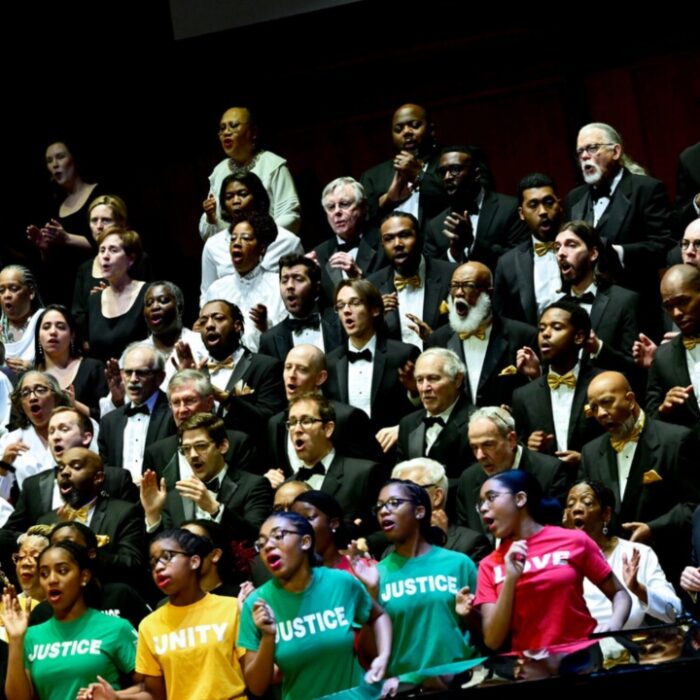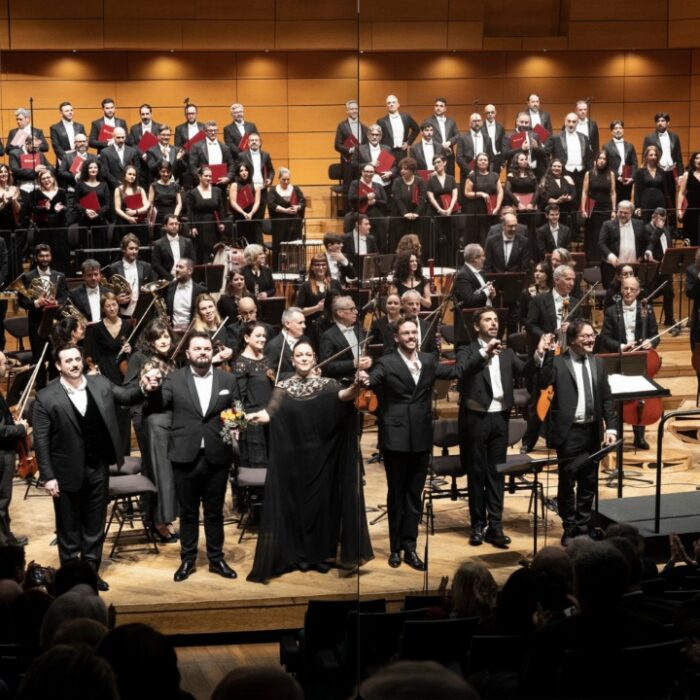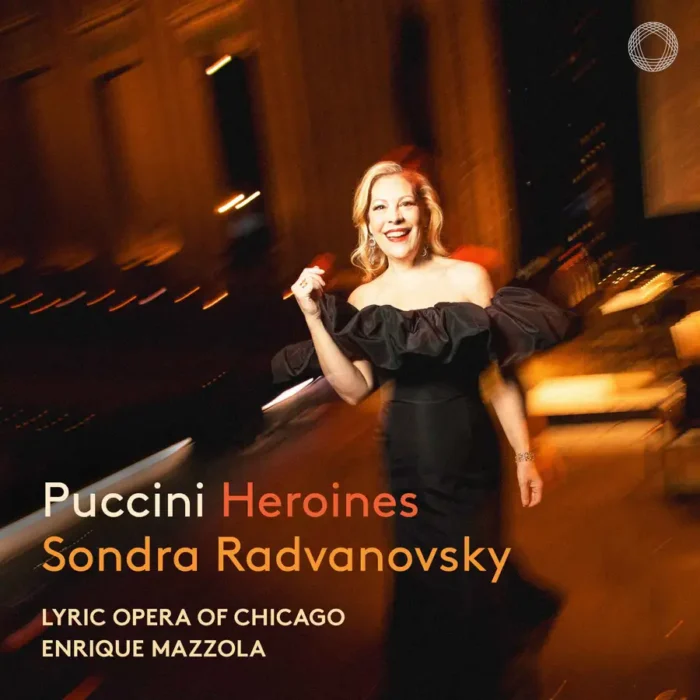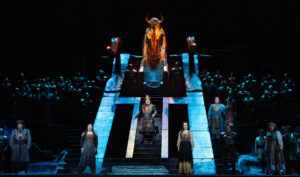
Metropolitan Opera 2023-24 Review: Nabucco
Maria Barakova & SeokJong Baek Impress in Disappointing Verdi Revival
By Francisco Salazar(Credit: Marty Sohl / Met Opera)
“Nabucco” returned to the Metropolitan Opera after a seven-year absence. The opera was set to return during the 2020-21 season but was canceled due to the pandemic. Now Verdi’s early gem is finally back in the company’s legendary Elijah Moshinsky production that has become emblematic of the Met’s grandeur and its gorgeous tableaus.
Having premiered in 2001, the Moshinsky creation continues to be fresh and reliable and the painterly images are gorgeous to look. However, the production mostly relies on the cast to elevate these images.
On Oct. 4, 2023, that did not happen.
Standouts
Out of the lead soloists in the production, the standout of the evening was undoubtedly Maria Barakova as Fenena. Barakova expressed the vulnerability in her character through her gorgeous instrument, delivering a round mezzo that could easily float between ranges. Her prayer to God was a display of gorgeous legato lines that showcased the flexibility of her vocal power. And then there were the ensembles. Barakova’s voice is so large that in many instances, as the chorus overpowered the auditorium, Barakova’s instrument easily rode over the massive ensemble. You could hear that in the Act one finale and the Act two choral number.
In the role of Ismaele, SeokJong Baek made his Metropolitan Opera debut. While the role is small, the tenor did show some promise. In the opening trio “Io t’amava il regno il core,” he shaped his phrases with heroic sound and later demonstrated his flexibility as he decrescendoed his timbre to a pianissimo sound. In his small solo “Maledetto dal Signor,” Baek also displayed muscular tone. While one would have liked a little more nuance in his singing, it is perhaps as Calaf later this season where Baek will deliver bigger rewards.
In the role of Anna, Brittany Olivia Logan showed promise with her sweet timbre that easily projected over the chorus. Scott Scully and Le Bu were also solid additions to the cast as Abdallo and the High Priest of Baal.
The Chorus and Orchestra
It goes without saying that Verdi’s orchestra and chorus are vital to this opera. Daniele Callegari conducted the orchestra with swift tempi that started out in the rousing overture and continued throughout the evening. The conductor always made each scene move forward even in the slower sections, keeping the drama alive.
The chorus was also solid on this evening showing different emotions from anger at the beginning to anguish and desolation. The voices rang clearly and thrillingly into the hall. Among these major moments was the iconic “Va pensiero sul ali dorate.” The chorus transitioned from smooth phrases to explosive sounds back to the most pure pianissimo that seamlessly decrescendoed into nothing. Those final notes produced a silence that led to a rousing ovation. At the curtain call, Donald Palumbo and his chorus deservedly got a huge ovation.
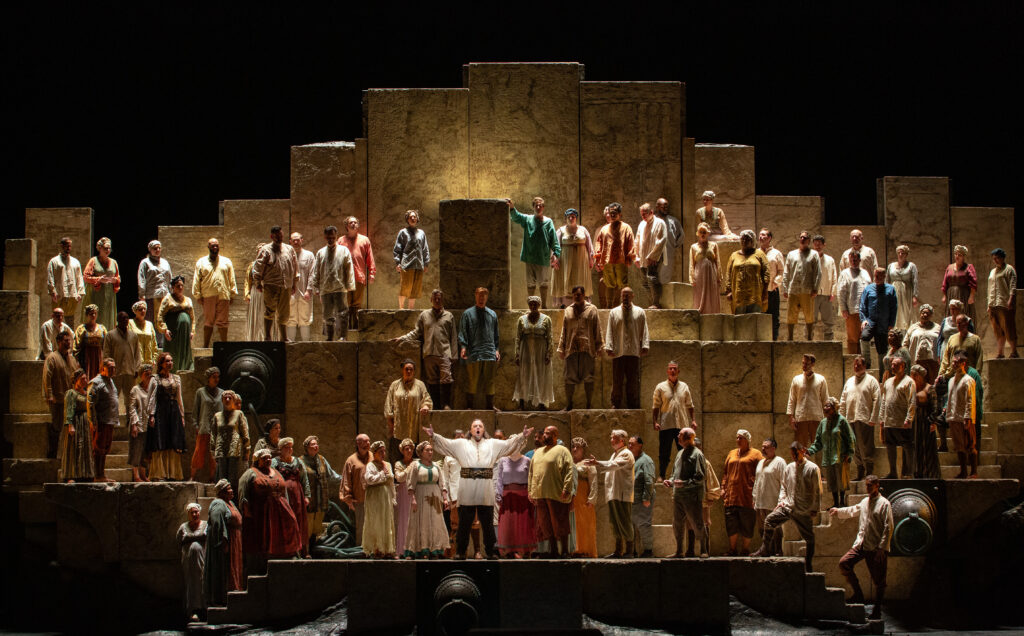
Marty Sohl / Met Opera
Uneven Leads
“Nabucco” is without a doubt an opera that requires three vocally healthy artists, considering that these are among the most demanding roles in the repertoire. Abigaille is described as a voice killer, while Nabucco is one of the most complex baritone roles in the Verdi canon. Zaccaria is one of the biggest bass roles in Verdi’s operas, featuring three arias.
Liudmyla Monastyrska returned to the role of Abigaille, a role she first sang at the Met in 2016. During that run of performances the soprano was praised for giving her finest vocal displays at the Met, which included an imposing and complex portrayal. Seven years later, Monastyrska continues to bring an imposing persona to the stage. However, her incisive and complex character is nowhere to be seen. She relishes the use of the evil eye but the overuse becomes increasingly superficial over the span of two hours, reducing the character to charicature. The repeated mannerisms extended to how she worked the stage. Throughout the evening Monastyrska walked around the stage side to side constantly until it was time for a high note. At that point, she walked toward stage right so that everyone could hear her impressive sound.
Monastryska’s voice is so powerful that she can sing over everyone on stage. However as impressive as it is, it became overwhelming when all she was doing was singing forte and the voice became wobbly and unsteady.
When Monastyrska first entered the stage on Wednesday night, an impressive sound came out during “ Guerrieri, è preso il tempio! …” but it was quickly evident her voice had lost its luster and evenness over time. The chest voice in “Prode guerrier! d’amore ” was hollow and the coloratura lines that followed this low passage were smudged and messy. During the trio, “Io t’amava il regno il core,” the soprano attempted a floated sound in her top register, but it quickly became forte and repetitive. It seemed as if she was having a difficult time sustaining a piannissimo sound.
Act two for Monastyrska was no better. The opening recitative “Ben io t’invenni, o fatal scritto!…” began with a forte outburst that never relented, lacking in subtly or nuance. As it climaxed, Monastyrska delivered uncontrolled coloratura without any sense of climax or build. In the aria “Anch’io dischiuso un giorno,” which is Abigaille’s moment of reflection, Verdi wrote long legato lines that are pure bel canto. On this night Monastyrska sang with a delicate sound, but she was hindered by choppy phrasing, disconnected roulades, and some forte sounds in the higher parts of her voice that felt disconnected from the rest of the approach. The aria felt patchy and uncomfortable in its execution.
The opening of the cabaletta “Salgo gia del trono aurato” saw some of Monastyrska’s best singing as she sang with impressive force and incredibly clean coloratura. It was as if we were finally seeing this Abigaille in control and you could sense the character’s thirst for vengeance. But that quickly went south in the second repeat as Monastyrska attempted variations and a lighter voice. The coloratura was once again sloppy and the cabaletta started to suffer from intonation. Her final High C was wobbly and strident.
Act three and four proved better for the soprano. During the duet, “Oh! di qual onta aggravasi,” Monastyrska was able to use some of her middle voice with accurate and well-timed staccato phrases. Her coloratura was also in better shape with the articulation very calculated, emphasizing Abigaille’s devilish character. She also scaled down the volume of the voice making for a more pleasant and even balanced duet with her Nabucco, George Gagnidze.
However, Monastyrska’s acting choice during this duet did not serve her well. Throughout the duet, she constantly moved up and down the staircase. This was a different choice from when she sang the production in 2016. Then she mostly stayed at the top of the elevated set piece. It showed Abigaille’s command over Nabucco and while she was still, it was striking. But in this instance, Monastyrska decided to move around the staircase and you could notice that as she went downstairs she broke character as she was concentrating on making sure she did not trip over her long dress. It unintentionally created the wrong kind of dramatic tension.
It was in her final aria, “Su me morente esanime” that Monastyrska was most effective. Her singing was raw and her timbre turned sweet. You could sense the character’s anguish and repentant intentions. The lines were not always connected nor extremely legato, but it was here where the soprano was most expressive, floating some gorgeous piano lines.
In the role of Zaccaria, Dmitry Belosselskiy reprised his portrayal from seven years ago. On this evening, the bass came out on stage with a booming voice that increasingly became uneven. His first aria, “D’Egitto la sui lidi” which is full of legato lines, was sung without any weight and replete with disconnected phrases. It was as if Belosselskiy was having a hard time moving from his middle register to the lower parts of his voice. The cabaletta, “Come notte a sol fulgente” was also sung with very choppy staccato lines that had no flexibility and cost him resonance in his higher register. During the second repeat, Belosselskiy attempted some variations which were smudged, airy, and strident. All in all, props to him for not cutting the cabaletta, but he didn’t sound comfortable with the choice.
Belosselskiy’s second aria, “Vieni o Levita” was unrecognizable as it was marred by uneven sound and a very present wobble. While the bass attempted to restrain his voice in this piece, his legato line was hard to hear and his low notes came off as hollow. He didn’t fare any better during the final solo piece in Act three, ”Del futuro nel bujo discerno,” where the bass’ sound was simply drowned out by the massive chorus.
Of the three principal roles, George Gagnidze had the best performance of the evening. But it didn’t start out smoothly with the baritone’s opening sounding unsteady. His second scene, in which Nabucco declares himself not only king but God, was a showstopper for the Gagnidze as he immersed himself into his character; Gagnidze’s voice had a weakened quality that emphasized Nabucco’s confused and sorrowful state. “Chi mi toglie il regio scettro” was sung with such expressive quality that any vocal imperfections were forgiven for how moving this moment was.
In the Act three duet with Monastyrska, Gagnidze sang gorgeous legato lines especially in “Deh perdona,” that emphasized the pain in his Nabucco. It was a great contrast from Monastryska’s more staccato and harsh lines. In his aria, “Dio di Guida,” Gagnidze continued with his expressive singing, delivering a booming baritone while also implementing suave and connected lines that emphasized the prayer-like quality. The cabaletta, “O prodi miei,” could have used more heroic power and vocal flexibility, but his commanding stage presence was what convinced you that the king was back. All in all, it was a solid evening for the baritone.
In conclusion, this was an evening that did not live up to the Met’s standards. One hopes that with more performances on the way, things will improve before it gets its January HD recording,
